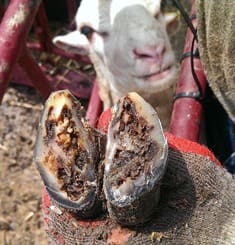 A FOOTROT vaccine available for all but rare strains of the debilitating sheep hoof disease has been developed by the University of Sydney School of Veterinary Science.
A FOOTROT vaccine available for all but rare strains of the debilitating sheep hoof disease has been developed by the University of Sydney School of Veterinary Science.
Australian Wool Innovation said the serogroup-specific footrot vaccine is now being manufactured by Tréidlia Biovet Pty Ltd and is now available to Australian sheep producers.
Professor Richard Whittington from the University of Sydney’s School of Veterinary Science said the vaccine can only be used after testing has been conducted to determine which virulent serogroups of footrot are present in the flock.
“This involves taking swabs from feet with footrot and culturing them in the laboratory and then applying tests to determine which of the 10 (A to I or M) serogroups are present, and how virulent that isolate is. The correct serogroups can then be incorporated into the vaccine.”
Senior research fellow Om Dhungyel, who conducted most of the field research, emphasised that only one or two serogroups could be incorporated into the vaccine at a time.
“Very good cure rates and at least six months protection result if no more than two serogroups are injected at one time,” Om said.
“Additional ‘rounds’ (a priming and booster shot four weeks apart) of vaccination can be commenced three months after starting the first round if more than two serogroups are present in the flock.
“It is still crucial to follow up vaccination with several rounds of thorough foot inspection and culling of any remaining infected sheep,” he said.
Tréidlia Biovet director Mark White said that vaccine was available now for all but the rare M serogroup. A couple of week’s notice between ordering and supply is required to do the final customisation for each farm.
“Your veterinary practitioner must authorise the supply of the vaccine as well, so it is best to involve your vet right from the start at the sampling stage.
“Approval of the Chief Veterinary Officer is also required in WA, SA and NSW where virulent footrot is a notifiable disease, so discuss this option with your Departmental Veterinary Officer if you are in one of these three states and would like to use vaccine”.
Sheep veterinary consultant Dr Paul Nilon from Nilon Farm Health said he has used the serogroup specific vaccines on a number of flocks in Tasmania and usually achieved a good result if all the virulent serogroups present were identified and the flock manager is meticulous with the post vaccination inspections.
The University of Sydney and Australian Wool Innovation funded evaluation of specific footrot vaccine on 12 farms and the University of Sydney and Department of Primary Industries, Parks, Water and Environment Tasmania supported on-going studies leading to commercialisation of the vaccine.
More information of the use of serogroup specific vaccines is available at wool.com/footrot.
Source: AWI.



HAVE YOUR SAY